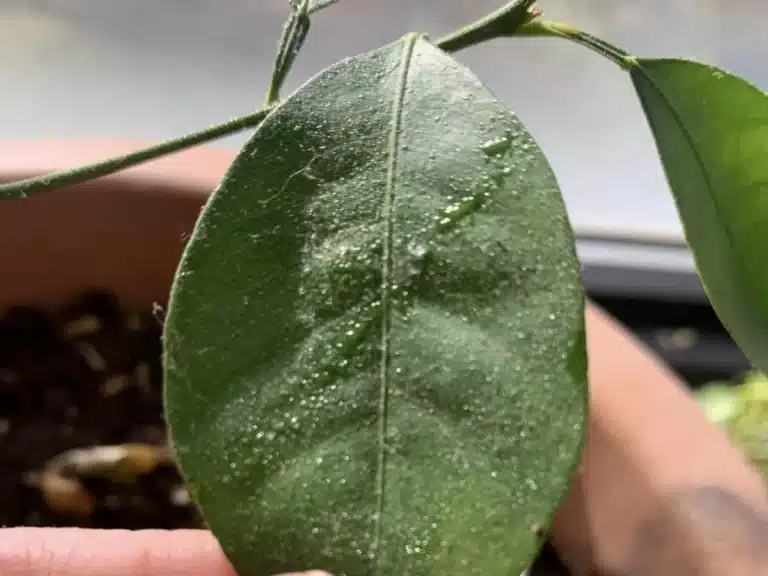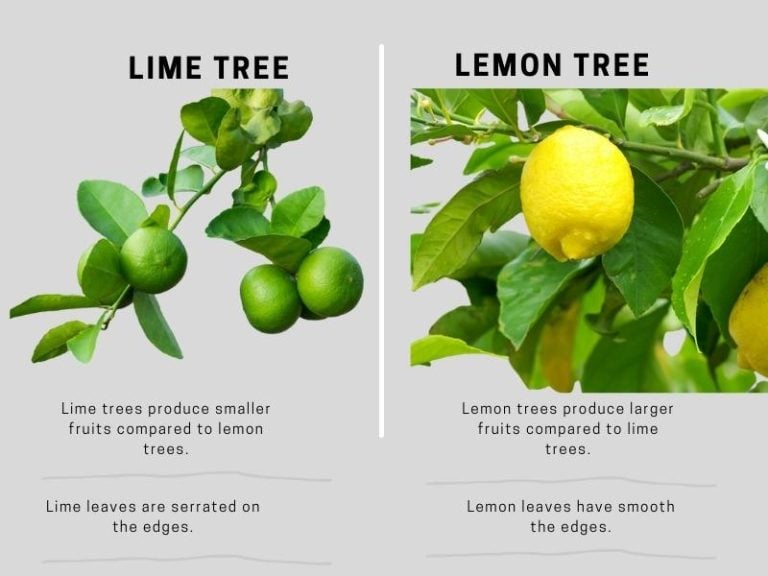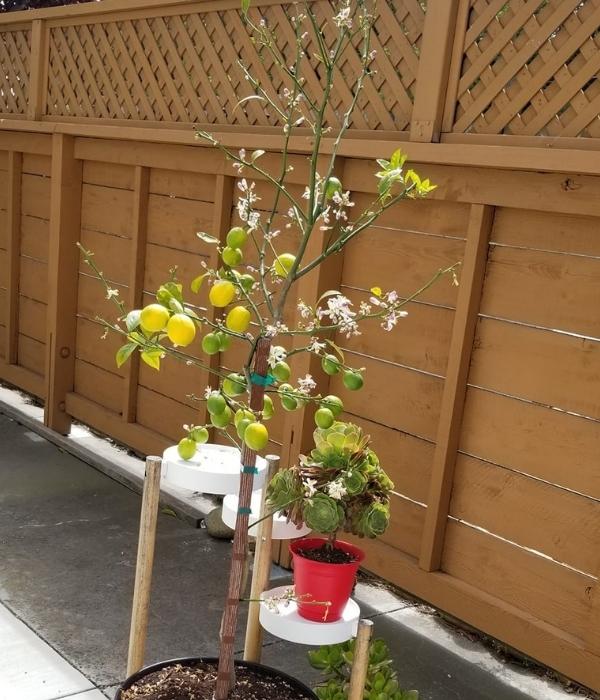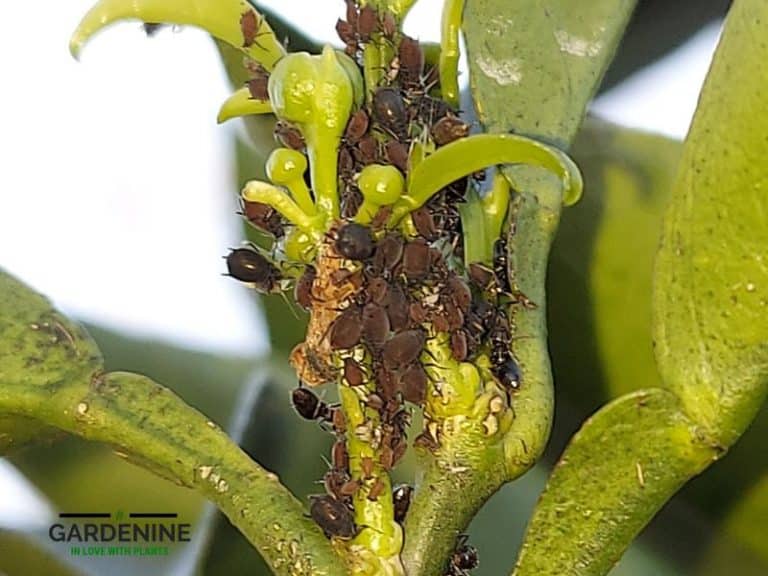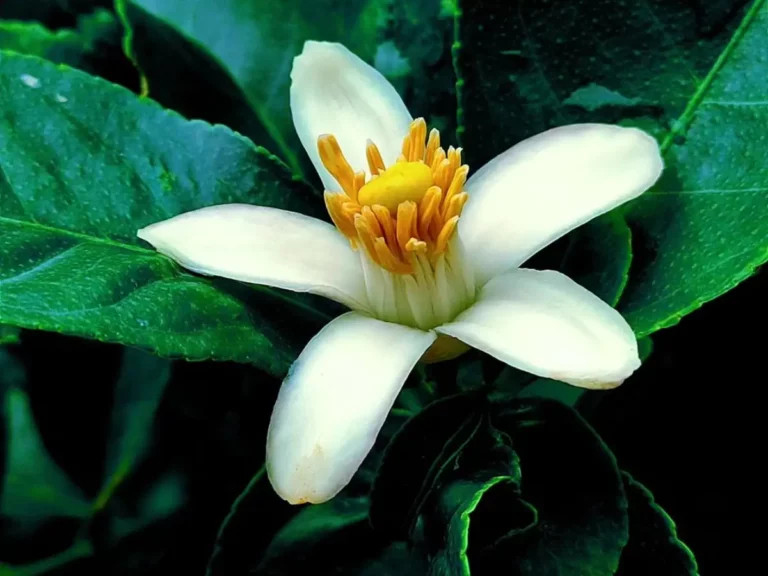Soil for Lemon Trees – Best Potting Mixes & Recipe
Lemon trees often adapt to any type of soil except heavy clay soil as it is closely packed and will drain poorly. For most citrus trees to grow and thrive, they should be planted in a rich and well-draining medium that allows the movement of nutrients and moisture.
In this regard, what’s the best soil for lemon trees?
The best soil for lemon trees should be well-draining sandy loam soil with a pH between 5.5-6.5. The ideal soil mix contains 60% sand for drainage, 10% clay to retain some moisture, and 30% silt to hold nutrients, with a light and fluffy texture full of organic matter like compost or mulch.
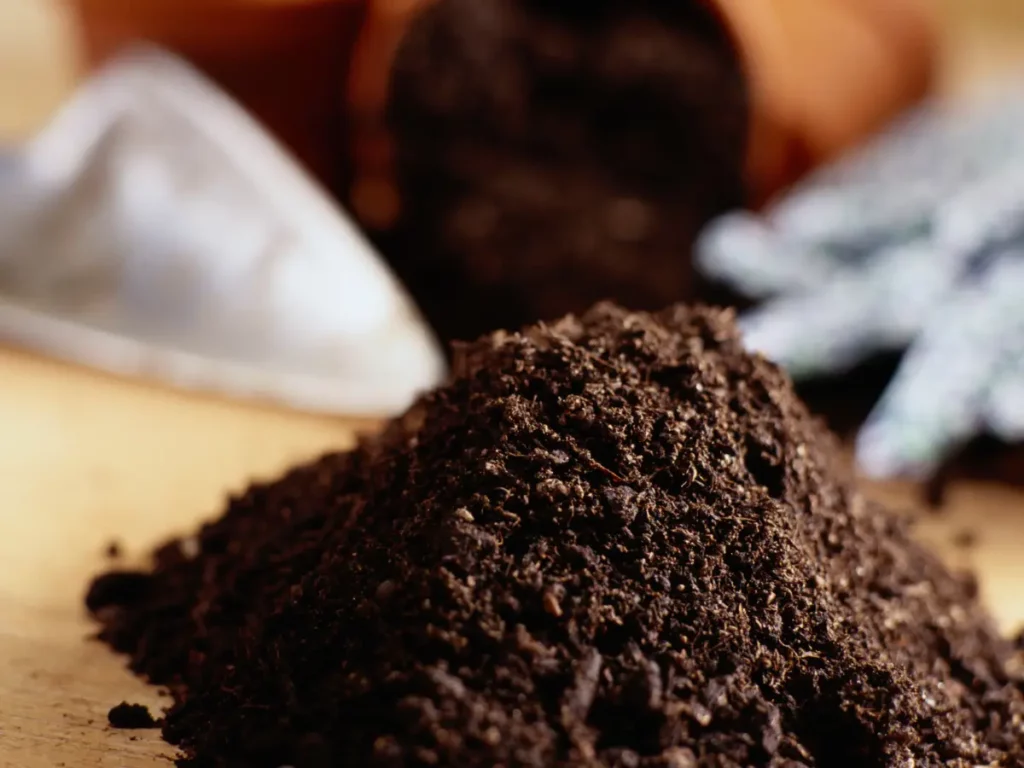
Testing the soil before planting is key, but you can also amend the soil to make it suitable for your citrus. I’ll teach you how to make your own soil mix for potted lemon plants with a simple recipe.
Best Soil Mixes for Lemon Trees
Every 3-4 years, you need to repot your lemon trees to keep them invigorated and healthy. This is the time you need to buy a new soil mix for the job.
My advice: buy a soil mix that’s loose, well-drained, and has materials such as sand, perlite, peat, and compost. Here are some of the best soil mixes I recommend (and why they’re the best for lemon trees):
- Soil Sunrise Citrus Tree Potting Soil Mix
- GARDENERA Citrus Tree Potting Soil Mix
- Miracle-Gro Cactus, Palm & Citrus Soil
- Dr. Earth Gold Premium Potting Soil
Soil Sunrise Citrus Tree Potting Soil Mix
Soil Sunrise have a specialized potting mix that meets the needs of lemon trees and other citrus plants.
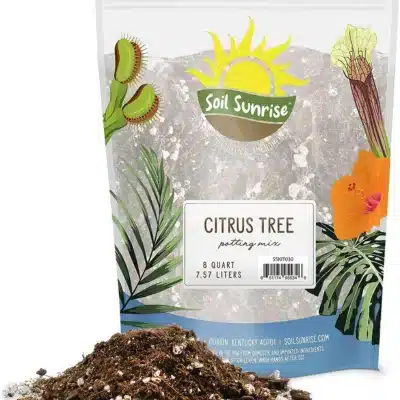
Why is this blend great for growing healthy, vibrant citrus trees?
- Formulated for citrus – The mix is a nutrient-rich blend with the essential nourishment citrus plants need to thrive. I recommend it for beginners getting into growing citrus in containers.
- Excellent drainage – Proper drainage is crucial for citrus trees to prevent root rot and other issues. I find that this mix drains well, so you won’t have problems with excess water. It still retains moisture quite well.
- Prevents root rot – The mix helps combat stubborn root rot problems by allowing excess water to drain away even if you overwater your lemon tree.
Recommended usage: For repotting, transplanting, or just refreshing your soil after a few years.
GARDENERA Citrus Potting Soil Mix
The GARDENERA Citrus Potting Soil Mix is a specialized blend designed just for lemon, lime, orange and other citrus trees. I like it for its tailored nutrient profile and improved drainage.
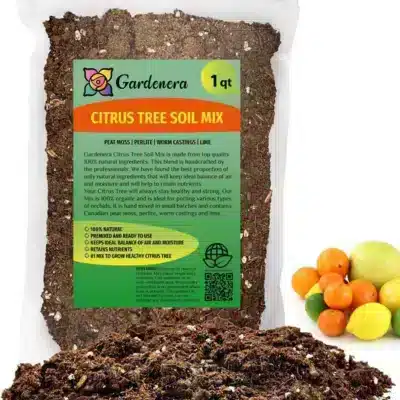
It is my go-to mix for container trees and also when planting in the ground.
Here’s why:
- Organic composition – The mix contains a foundation of organic ingredients like compost, giving citrus trees a natural, chemical-free growing environment. It is awesome for organic gardeners.
- Excellent drainage – As already mentioned, citrus trees can be prone to root rot, but this mix’s superior drainage capabilities allow excess water to drain away while still retaining moisture for the tree.
- Nutrient-rich – The mix provides nourishment for robust citrus growth and abundant fruit yields.
Using the Gardenera potting mix, I experienced improved tree growth, juicier fruit, and noticeable root rot reduction.
Miracle-Gro Cactus, Palm & Citrus Potting Mix
Miracle-Grow is the standard potting mix for any grower looking for a product without disappointments.
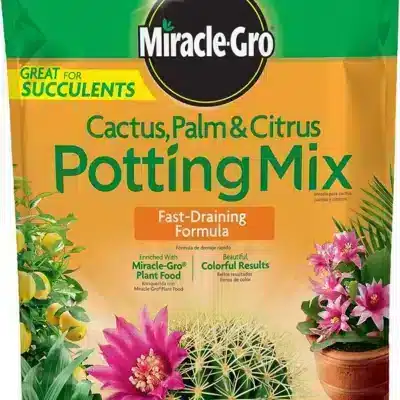
It is a premium all-purpose blend suitable for a wide variety of plants. The Miracle-Gro Cactus, Palm & Citrus Potting Mix is a high-quality choice that we recommend for nourishing lemon trees.
Here’s why I recommend it:
- Rich organic ingredients – The Miracle-Gro mix contains high-quality organic components like compost that provide optimal nutrition for citrus trees without chemical additives.
- Excellent drainage – Citrus requires well-draining soil, and this mix is designed to prevent waterlogging that can lead to root rot.
- Nutrient-rich – The soil should contain the essential macro- and micronutrients that citrus plants need for vigorous growth and fruiting. I’ve discussed more on these nutrients later in this article.
With its stellar nutrient profile, premier drainage capacity, and versatility, the Miracle-Gro Cactus, Palm & Citrus Potting Mix is a reliable choice for providing lemon trees with the nourishment they require in a well-draining, organic substrate.
Dr. Earth Gold Premium Potting Soil
Dr. Earth Gold Premium Potting Soil is a top-quality organic potting mix that makes an excellent choice for nourishing lemon and other citrus trees.
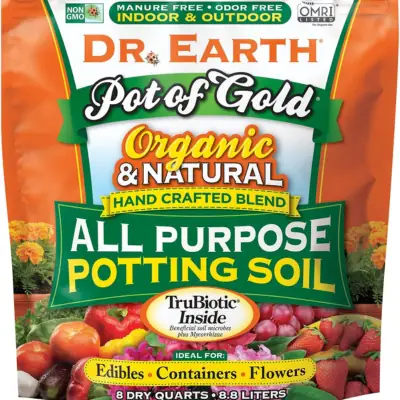
Here’s what makes this potting soil ideal for lemon trees.
- TruBiotic controlled release fertilizer – This special organic fertilizer provides a steady feed of nutrients to citrus trees for up to 6 months, so you won’t have to fertilize your lemon trees during this period.
- Nutrients-rich – Besides the time-release fertilizer, the mix also contains Pro-Moisture Hydrate, humic acids, seven strains of beneficial soil microbes, and other essential nutrients that citrus craves.
- Contains coconut coir and compost – The sustainable, organic base of coconut coir and compost retains some moisture while still draining well for healthy citrus roots.
- Natural and Organic – No synthetic chemicals; this mix provides an ideal and safe growing environment for vibrant citrus trees.
With these features, I find Dr. Earth’s soil one of the best mixes to grow lemon and citrus trees in containers and gardens.
Qualities of the Ideal Soil
The ideal soil for growing healthy, productive lemon trees has several essential qualities:
Soil Type
The optimal soil type is a sandy loam that contains a blend of sand, silt, and clay. This kind of soil provides the right balance of drainage, moisture retention, and nutrient-holding capacity.
If you’re buying potting soil, check that the soil isn’t too heavy or contains a high percentage of clay, which can lead to waterlogging.
We like a light and fluffy sandy loam amended with organic matter for container citrus trees.
Soil pH
Lemon trees thrive best in slightly acidic soil with a pH between 5.5 – 6.5. This range enables optimal availability of essential nutrients. If the soil pH is too acidic or alkaline, the plant struggles to draw nutrients, eventually causing deficiency symptoms.
Gardener’s hack: If the acidity is too high, add lime to increase the pH or use ammoniacal nitrogen fertilizer continuously to reduce the pH by nitrification.
Drainage
Excellent drainage is crucial to prevent root rot disease and other waterlogging problems. Excess moisture should rapidly percolate down through the soil profile. That’s why we like the soil loose and particulate.
If you’re making your own soil mix, you can improve drainage by mixing in perlite, vermiculite, or small gravel.
Nutrient Content
The ideal citrus tree soil should be nutrient-rich to provide essential elements like nitrogen, phosphorus, potassium, calcium, magnesium, sulfur, iron, and manganese.
These nutrients are best organically from sources like compost, manure, mulch, bone meal, etc. I personally like slow-release organic fertilizers for my lemon trees.
DIY Soil Mix for Lemon Trees
If you don’t want a commercial soil mix, you can whip up the perfect light, nutrient-rich, and well-draining blend right at home.
Here’s what you’ll need:
- High-quality potting soil or compost as a base
- Coarse sand
- Perlite or pumice for drainage
- Organic fertilizers like compost or worm castings
- Ground eggshells for calcium
- Epsom salts for magnesium
- Peat moss (optional for moisture retention)
A basic lemon tree soil recipe is:
- 2 parts potting soil or compost
- 1 part coarse sand
- 1 part perlite or pumice
Mix in the organic fertilizers and nutritional boosters:
- 1 cup worm castings or compost per 2 gallons of soil blend
- 1 tablespoon ground eggshells per 2 gallons
- 1 tablespoon Epsom salts per 2 gallons
If using peat moss, replace up to 1/4 of the potting soil with sphagnum peat moss.
Procedure
- Blend the potting soil, sand, perlite/pumice, and peat moss.
- Mix thoroughly until uniform.
- Add the organic fertilizers and amendments next.
- Mix again until fully incorporated.
- Moisten the soil as you mix to achieve an even consistency that clumps together slightly when squeezed.
The result is a light, nutrient-packed custom soil for your lemon tree. You can adjust the recipe based on available ingredients and share what works for you in the comment section below.
Nutrient requirements for lemon trees
Lemon trees feed heavily and need a lot of energy. Nutrients required by lemon trees are classified as macronutrients and micronutrients. They are both essential, but macronutrients are needed in large quantities, and lemon trees require additional application of these components, while micronutrients are needed in small amounts.
Below are the essential nutrients required for lemon trees:
| Nutrient | Function |
| Nitrogen (N) | Nitrogen is essential because lemon trees need it in large amounts for growth and coloration. A generous amount of nitrogen compound is required in every plant cell for normal cell division, respiration, and growth. |
| Potassium (K) | Phosphorus is used for several life processes like photosynthesis, synthesis, and breakdown of carbohydrates within the lemon tree. It helps the tree use energy from photosynthesis to form seeds, speed maturity, and develop roots. |
| Phosphorus (P) | Phosphorus is used for several life processes like photosynthesis, synthesis, breakdown of carbohydrates within the lemon tree. It helps the tree use energy from photosynthesis to form seeds, speed maturity, and develop roots. |
| Calcium (Ca) | Calcium mainly inhabits the leaves of a plant. It is essential for the development and functioning of the root. It is required for chromosome cell division and stability. An inadequate supply of calcium can reduce your lemon tree’s fruit yield and growth. |
| Sulfur (S) | Sulfur improves root growth and encourages strong and healthy plants, and is a necessary component for many proteins. It is also essential for producing chlorophyll, and amino acids, and is an element of vitamins and some plant hormones. Sulfur boosts the development of nodules and nitrogen fixation by legumes. |
| Magnesium (Mg) | Magnesium is necessary for chlorophyll and seed development. It acts as an activator for several enzymes. Magnesium determines the movement of carbohydrates to the parts of the tree. Magnesium also stimulates the uptake and transport of phosphorus. |
| Iron (Fe) | Iron is involved in some photosynthetic and respiratory enzyme systems. It acts as a catalyst in the production of chlorophyll. |
| Zinc (Zn) | Zinc is essential in the formation of chlorophyll of some enzyme systems that regulate various metabolic activities within your lemon tree plant. Zinc is also needed to form auxins that promote your plant’s growth. |
| Copper (Cu) | Zinc is essential in forming chlorophyll of some enzyme systems that regulate various metabolic activities within your lemon tree plant. Zinc is also needed to form auxins that promote your plant’s growth. |
| Manganese (Mn) | It plays an essential role in nitrogen metabolism and respiration. Manganese is involved in producing proteins and amino acids and acts as an activator for some enzymes. |
| Boron (B) | It is essential in flowering, sugar translocation, pollen tube growth, carbohydrate metabolism, and hormone activity. Boron also ensures proper utilization of calcium by maintaining it in a soluble form. |
| Molybdenum (Mo) | It acts as a catalyst that helps convert gaseous nitrogen to usable forms by nitrogen-fixing microorganisms. It also assists in forming proteins, starch, amino acids, and vitamins. |
| Chlorine (Cl) | Chlorine helps in producing oxygen in photosynthesis. It has a role in plant metabolism. |
FAQ
No, regular potting soil is not ideal for lemon trees as it retains more water and does not drain well. The best soil for lemon trees is a well-draining sandy-loam mix containing compost and inorganic materials like perlite or vermiculite for improved aeration and drainage.
Yes, cactus soil can be used for lemon trees as it is fast-draining and prevents waterlogging. However, cactus soil lacks nutrients, so it should be amended with organic compost or fertilizer to provide the nutrients lemon trees require.
The ideal soil for citrus trees is a sandy-loam mix that drains well while retaining some moisture and nutrients. It should contain 60% sand, 10% clay, 30% silt with a pH of 5.5-6.5. Adding compost, mulch, perlite, and organic fertilizer provides the ideal nutrition and soil structure.


